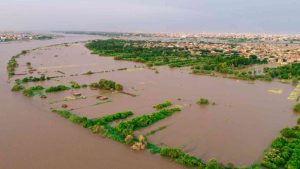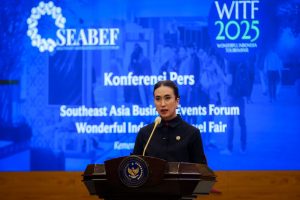by Syarif Hidayat*
 Al-Fatah Islamic boarding school which is organized by “Jamaah Muslimin” (Muslim Congregation) has succeeded in transforming a remote village in Lampung, Indonesia called Muhajirun into an ultra modern online Islamic teaching facilities especially the Shuffah Al Qur’an Abdullah bin Mas’ud (SQABM) online.
Al-Fatah Islamic boarding school which is organized by “Jamaah Muslimin” (Muslim Congregation) has succeeded in transforming a remote village in Lampung, Indonesia called Muhajirun into an ultra modern online Islamic teaching facilities especially the Shuffah Al Qur’an Abdullah bin Mas’ud (SQABM) online.
Imaamul Muslimin Muhyiddin Hamidy a speech during the grand launching of Shuffah Al Qur’an Abdullah bin Mas’ud (SQABM) online, stated Al-Quran is the only solution to change and improve the human civilization.
Hamidy, who is also the streering commettee of Al-Fatah foundation, also reminded that the damage in economic, social, cultural, moral sector are the result of human disobidience to Allah.
“Our obligation is to restore human behavior through the study and practice of Al-Qur’an,” he said in front of thousands of audiences in SQABM grand launching, in Muhajirun, Lampung, approximately 191 km southwest of Jakarta, Tuesday (November 19. 2013).
Also Read: Egypt, Qatar Deliver Trump’s Gaza Ceasefire Proposal to Hamas
Right now there are few people who persevere in studying Al-Qur’an. The presence of SQABM online using high speed internet connection through fiber optic networks, is expected to be the driving force for Muslims to learn, understand and practice the guidance of the Qur’an.
The establishment of the institution based on the reality that millions of Muslims do not have the opportunity to learn Al-Quran for many reasons, especially economic, political and geographical reasons.
For Muslims who are living in minority areas, or in a communist ideology state, it is difficult for them to organize Islamic educational institution recognized by the government.
“Those are the background of the establishment of SQABM. By using online system, it’s easier for everyone to join this course,” he added .
“In SQABM course, students from around the world can learn to read, memorize and interpret the Qur’an through online course that is supported by high speed internet connection using fiber optic networks. It can be followed 24 hours a day,” he said.
Also Read: Israeli Airstrikes Kill 54 Palestinians Across Gaza
Islam: A Global Civilization
In the Name of Allah, the Beneficent, the Merciful. This day, I have perfected your religion for you, completed My Favour upon you, and have chosen for you Islâm as your religion. But as for him who is forced by severe hunger, with no inclination to sin (such can eat these above mentioned meats), then surely, Allâh is Oft-Forgiving, Most Merciful. (Al-Qur’an, Surah Maidah (5), Verse:3)
Islam is a religion based upon the surrender to God who is One. The very name of the religion, AL ISLAM in Arabic, means at once submission and peace, for it is in submitting to God’s Will that human beings gain peace in their lives in this world and in the hereafter.
The message of Islam concerns God, who in Arabic is called Allah, and it addresses itself to humanity’s most profound nature. It concerns men and women as they were created by God–not as fallen beings. Islam therefore considers itself to be not an innovation but a reassertion of the universal truth of all revelation which is God’s Oneness.
Also Read: School Bus Explosion in Pakistan Kills Five, Military Accuses India
This truth was asserted by the prophets of old and especially by Abraham, the father of monotheism. Islam reveres all of these prophets including not only Abraham, who is the father of the Arabs as well as of the Jews, but also Moses and Christ.
The Prophet and Messenger of God, Muhammad–may peace and blessings be upon him, his family and his companions–, was the last of this long lime of prophets and Islam is the last religion until the Day of Judgement. It is the final expression of the Abrahamic tradition.
One should in fact properly speak of the Judeo-Christian-Islamic tradition. One should in fact properly speak of the Judeo-Christian-Islamic tradition, for Islam shares with the other Abrahamic religions their sacred history, the basic ethical teachings contained in the Ten Commandments and above all, belief in the One God.
And it renews and repeats the true beliefs of Jews and Christians whose scriptures are mentioned as divinely revealed books in Islam’s own sacred book, the Quran.
Also Read: Half a Million People in Gaza on the Risk of Starvation: IPC
Al-Qur’an
For Muslims, or followers of Islam, the Quran is the actual Word of God revealed through the archangel Gabriel to the Prophet of Islam during the twenty-three-years period of his prophetic mission. It was revealed in the Arabic language as a sonoral revelation which the Prophet repeated to his companions.
Arabic became therefore the language of Islam even for non-Arab Muslims. Under the direction of the Prophet, the verses and chapters were organized in the order known to Muslims to this day. There is only one text of Quran accepted by all schools of Islamic thought and there are no variants.
Also Read: Israeli Captive Says “Only a Deal Will Bring Us Home”
The Quran is the central sacred reality of Islam. The sound of the Quran is the first and last sound that a Muslim hears in this life. As the direct Word of God and the embodiment of God’s Will, the Quran is considered as the guide par excellence for the life of Muslims. It is the source of all Islamic doctrines and ethics.
Both the intellectual aspects of Islam and Islamic Law have their source in the Quran. Perhaps there is no book revered by any human collectivity as much as the Quran is revered by Muslims. Essentially a religion of the book, Islam sees all authentic religions as being associated with a scripture. That is why Muslims call Christians and Jews the “people of the book”.
Throughout all its chapters and verses, the Quran emphasizes the significance of knowledge and encourages Muslims to learn and to acquire knowledge not only of God’s laws and religious injunctions, in a language rich in its varied terminology, to the importance of seeing, contemplating, and reasoning about the world of creation and its diverse phenomena.
It places the gaining of knowledge as the highest religious activity, one that is most pleasing in God’s eyes. That is why wherever the message of the Quran was accepted and understood, the quest for knowledge flourished.
Also Read: Al-Quds Brigades Seize Israeli Surveillance Drone Over Khan Younis
The Prophet PBUH: The most perfect of human beings
The Prophet of Islam is loved and revered by Muslims precisely because he was chosen by God to reveal His Word to mankind. The Prophet Muhammad PBUH is not considered to be divine but a human being. However, he is seen as the most perfect of human beings, shining like a jewel among stones.
He was born in 570 A. D. in one of the most powerful tribes in the Arabia of that time, for it had guardianship over the Ka’bah in Makkah. An orphan brought up by his grandfather and later by his uncle, the young Muhammad displayed exceptional virtue as a trustworthy individual whom members of various tribes would invite to act as arbitrator in their disputes.
Also Read: Hamas Expresses Readiness for Comprehensive Deal with Israel for Hostage Release
At that time the Arabs followed a form of idolatry, each tribe keeping its own idols at the Ka’bah, the cubical structure built originally by Abraham to celebrate the glory of the One God. But the monotheistic message of Abraham had long become forgotten among the general population of the Arabian peninsula. The young Muhammad, however was a believer in the One God all of his life and never participated in the idolatrous practices of his tribe.
When forty years old, during one of the retreats which he made habitually in a cave on top of a mountain outside Makkah, Muhammad first saw the archangel Gabriel who revealed God’s Word to him, the Quran, and announced the Muhammad is the messenger of God. For the next thirteen years he preached the Word of God to the Makkans, inviting them to abandon idolatry and accept the religion of Oneness.
A few accepted his call but most Makkans, especially those of his own tribe, opposed him violently, seeing in the new religion a grave danger to their economic as well as social domination based upon their control of the Ka’bah. But the Prophet continued to call the people to Islam and gradually a larger number of men and women began to accept the faith and submit themselves to its teachings. As a result, persecution of Muslims increased until the Prophet was forced to send some of his companions to Abyssina where they were protected by the Christian King.
The Makkan period was also one of intense spiritual experience for the Prophet and the noble companions who formed the nucleus of the new religious community which was soon to spread worldwide. It was during this period that God ordered the direction of prayers to be changed from Jerusalem to Makkah. To this day Jerusalem remains along with Makkah and Madinah one of the holiest cities of Islam.
Also Read: Israel Reaffirms Total Blockade on Humanitarian Aid to Gaza Amid Global Outcry
In 622 A. D. the Prophet was ordered by God to migrate to Yathrib, a city north of Makkah. He followed the Divine Command and left with his followers for that city which henceforth was known as “The City of the Prophet” (Madinat al-nabi) or simply Madinah. This event was so momentous that the Islamic calendar begins with this migration (hijrah).
In Madinah, the Prophet established the first Islamic society which has served as the model for all later Islamic societies. Several battles took place against the invading Makkans which the Muslims won against great odds. Soon more tribes began to join Islam and within a few years most of Arabia had embraced the religion of Islam.
After many trials and eventually successive victories, the Prophet returned triumphantly to Makkah where the people embraced Islam at last. He forgave all his former enemies and marched to the Ka’bah, where he ordered his companion and cousin ‘Ali to join him in destroying all the idols. The Prophet reconstituted the rite of pilgrimage as founded by Abraham.
The Prophet then returned to Madinah and made another pilgrimage to Makkah. It was upon returning from this last pilgrim that he delivered his farewell address. Soon he fell ill and after three day s died in 632 A. D. in Madinah where he was buried in the chamber of his house next to the first mosque of Islam.
Also Read: Israeli Captive in Gaza Sends Emotional Plea to Netanyahu for His Release
The Practices and traditions (Sunnah) of the Prophet which includes his sayings (Hadith) became the guide for Muslims in the understanding of the Quran and the practice of their religion. The Quran itself asserts that God has chosen in the Prophet an example for Muslims to follow.
Besides this emulation of the Prophet in all aspects of life and thought, his sayings were assembled by various scholars. Finally they were codified in books of Hadith where the authentic were separated from the spurious. The Sunnah has always remained, after the Quran, the second source of everything Islamic.
Islam-A World Civilization
Also Read: Extremist Settlers Storm Al-Aqsa Mosque Under Heavy Israeli Police Protection
In the Name of Allah, the Beneficent, the Merciful.”Thus We have appointed you a middle nation, that ye may be witnesses against mankind, and that the messenger may be a witness against you. And We appointed the qiblah which ye formerly observed only that We might know him who followeth the messenger, from him who turneth on his heels. In truth it was a hard (test) save for those whom Allah guided. But it was not Allah’s purpose that your faith should be in vain, for Allah is Full of Pity, Merciful towards mankind.” (Al-Qur’an, Surah Al – Baqara (2), Verse: 143)
General characteristic of Islamic civilization
Islam was destined to become a world religion and to create a civilization which stretched from one end of the globe to the other. Already during the early Muslim caliphates, first the Arabs, then the Persians and later the Turks set about to create classical Islamic civilization.
Later, in the 13th century, both Africa and India became great centers of Islamic civilization and soon thereafter Muslim kingdoms were established in the Malay-Indonesian world while Chinese Muslims flourished throughout china.
Islam is a religion for all people from whatever race or background they might be. That is why Islamic civilization is based on a unity which stands completely against any racial or ethnic discrimination. Such major racial and ethnic groups as the Arabs, Persians, Turks, Africans, Indians, Chinese and Malays in addition to numerous smaller units embraced Islam and contributed to the building of Islamic civilization.
Moreover, Islam was not opposed to learning from the earlier civilizations and incorporating their science, learning, and culture into its own world view, as long as they did not oppose the principles of Islam. Each ethnic and racial group which embraced Islam made its contribution to the one Islamic civilization to which everyone belonged.
The sense of brotherhood and sisterhood was so much emphasized that it overcame all local attachments to a particular tribe, race, or language-all of which became subservient to the universal brotherhood and sisterhood of Islam.
The global civilization thus created by Islam permitted people of diverse ethnic backgrounds to work together in cultivation various arts and sciences. Although the civilization was profoundly Islamic, even non-Muslim “people of the book” participated in the intellectual activity whose fruits belonged to everyone.
The scientific climate was reminiscent of the present situation in America where scientists and men and women of learning from all over the world are active in the advancement of knowledge which belongs to everyone.
The global civilization created by Islam also succeeded in activating the mind and thought of the people who entered its fold. As a result of Islam, the nomadic Arabs became torch-bearers of science and learning.
The Persians who had created a great civilization before the rise of Islam nevertheless produced much more science and learning in the Islamic period than before. The same can be said of the Turks and other peoples who embraced Islam.
The religion of Islam was itself responsible not only for the creation of a world civilization in which people of many different ethnic backgrounds participated, but it played a central role in developing intellectual and cultural life on a scale not seen before. For some eight hundred years Arabic remained the major intellectual and scientific language of the world.
During the centuries following the rise of Islam, Muslim dynasties ruling in various parts of the Islamic world bore witness to the flowering of Islamic culture and thought.
In fact this tradition of intellectual activity was eclipsed only at the beginning of modern times as a result of the weakening of faith among Muslims combined with external domination. And today this activity has begun anew in many parts of the Islamic world now that the Muslims have regained their political independence.
Islam and Knowledge
In the Name of Allah, the Beneficent, the Merciful. “Read! In the Name of your Lord, Who has created (all that exists), He has created man from a clot (a piece of thick coagulated blood) Read! And your Lord is the Most Generous, Who has taught (the writing) by the pen. He has taught man that which he knew not.” (Al-Qur’an, Surah Al-Alaq (96), Verses: 1-5)
The attitude of the Qur’an and the Prophet PBUH toward knowledge
Islam is a religion based upon knowledge for it is ultimately knowledge of the Oneness of God combined with faith and total commitment to Him that saves man. The text of the Quran is replete with verses inviting man to use his intellect, to ponder, to think and to know, for the goal of human life is to discover the Truth which is none other than worshipping God in His Oneness.
The Hadith literature is also full of references to the importance of knowledge. Such sayings of the Prophet as “Seek knowledge even in China”, “Seek knowledge from the cradle to the grave”, and Verily the men of knowledge are the inheritors of the prophets”, have echoed throughout the history of Islam and incited Muslims to seek knowledge wherever it might be found.
During most of its history, Islamic civilization has been witness to a veritable celebration of knowledge. That is why every traditional Islamic city possessed public and private libraries and some cities like Cordoba and Baghdad boasted of libraries with over 400,000 books. Such cities also had bookstores, some of which sold a large number of titles. That is also why the scholar has always been held in the highest esteem in Islamic society.
The integration of the pre-Islamic sciences
As Islam spread northward into Syria, Egypt, and the Persian empire, it came face to face with the sciences of antiquity whose heritage had been preserved in centers which now became a part of the Islamic world.
Alexandria had been a major center of sciences and learning for centuries. The Greek learning cultivated in Alexandria was opposed by the Byzantines who had burned its library long before the advent of Islam. The tradition of Alexandrian learning did not die, however.
It was transferred to Antioch and from there farther east to such cities as Edessa by eastern Christians who stood in sharp opposition to Byzantium and wished to have their own independent centers of learning.
Moreover, the Persian king, Shapur I, had established Jundishapur in Persia as a second great center of learning matching Antioch. He even invited Indian physicians and mathematicians to teach in this major seat of learning, in addition to the Christian scholars who taught in Syriac as well as the Persians whose medium of instruction was Pahlavi.
Once Muslims established the new Islamic order during the Umayyad period, they turned their attention to these centers of learning which had been preserved and sought to acquaint themselves with the knowledge taught and cultivated in them.
They therefore set about with a concerted effort of translate the philosophical and scientific works which were available to them from not only Greek and Syriac (which was the language of eastern Christian scholars) but also from Pahlavi, the scholarly language of pro-Islamic Persia, and even from Sanskrit.
Many of the accomplished translators were Christian Arabs such as Hunayn ibn Ishaq, who was also an outstanding physician, and others Persians such as Ibn Muqaffa’, who played a major role in the creation of the new Arabic prose style conductive to the expression of philosophical and scientific writing.
The great movement of translation lasted from the beginning of the 8th to the end of the 9th century, reaching its peak with the establishment of the House of Wisdom (Bayt al-hikmah) by the caliph al-Ma’mun at the beginning of the 9th century.
The result of this extensive effort of the Islamic community to confront the challenge of the presence of the various philosophies and sciences of antiquity and to understand and digest them in its own terms and according to its own world view was the translation of a vast corpus of writings into Arabic.
Most of the important philosophical and scientific works of Aristotle and his school, much of Plato and the Pythagorean school, and the major works of Greek astronomy, mathematics and medicine such as the Almagest of Ptolemy, The Elements of Euclid, and the works of Hippocrates and Galen, were all rendered into Arabic.
Furthermore, important works of astronomy, mathematics and medicine were translated from Pahlavi and Sanskrit. As a result, Arabic became the most important scientific language of the world for many centuries and the depository of much of the wisdom and the sciences of antiquity.
The Muslims did not translate the scientific and philosophical works of other civilizations out of fear of political or economic domination but because the structure of Islam itself is based upon the primacy of knowledge.
Nor did they consider these forms of knowing as “un-Islamic” as long as they confirmed the doctrine of God’s Oneness which Islam considers to have been at the heart of every authentic revelation from God.
Once these sciences and philosophies confirmed the principle of Oneness, the Muslims considered them as their own. They made them part of their world view and began to cultivate the Islamic sciences based on what they had translated, analyzed, criticized, and assimilated, rejecting what was not in conformity with the Islamic perspective.
The Islamic world remains today a vast land stretching from the Atlantic to the Pacific, with an important presence in Europe and America, animated by the teachings of Islam and seeking to assert its own identity.
Despite the presence of nationalism and various secular ideologies in their midst, Muslims various secular ideologies in their midst, Muslims wish to live in the modern world but without simply imitating blindly the ways followed by the West.
The Islamic world wishes to live at peace with the West as well as the East but at the same time not to be dominated by them. It wishes to devote its resources and energies to building a better lift for its people on the basis of the teachings of Islam and not to squander its resources in either internal or external conflicts.
It seeds finally to create better understanding with the West and to be better understanding each other better that they can serve their own people more successfully and also contribute to a better life for the whole of humanity.
Abdullah bin Mas’ud
The chairman of SQABM, Yakhsyallah Mansur in his speech said the name of Abdullah bin Mas’ud in the institution derived from the name of the Prophet Mohamad’s companion who was well known of his his mastery of Al-Qur’an.
“Abdullah bin Mas’ud was one of the great companions of the Prophet PBUH era who got the recognition of his mastery to interpret Al-Qur’an. He had several times been asked to recite the verses of Al-Qur’an by the Prophet Muhammad PBUH,” said Yakhsyallah.
The main goal of the institution is to change the civilization based on the Qur’an as the main task of Prophet Muhammad PBUH to enhance noble human morality. The lecturers of SQABM are the competent persons in their fields. They come from several countries such as Sudan, Yemen, Malaysia and Indonesia.
SQABM teaching program is available in three languages: Indonesian, English and Arabic. The students can also learn other subject like tafsir (interpretation), history, and lughoh ( science of language).
Its mission is to educate the participants to behave according to the Qur’an and Sunnah and provide the foundation of understanding of Muslim leadership and Islam dak’wah capabilities through the support of science and technology.
Sudanese Ambassador to Indonesia Abd al-Rahim al-Siddiq said Muslims in Indonesia has a huge potential to lead the world as seen by its muslim scholars leverage.
“In Indonesia, Islam developed as the leader of the people, whereas in other countries generally by its government policy,” Al-Siddiq said. The potential will be stronger concurrently with the power of taking the holy Al-Quran as a complete rule of Muslims life, he added
“Prophet Muhammad and his companions led the glory of Islam in the past by taking Qu’ran as their guide,” he stressed.
He pointed out that the Islam civilization setbacks was caused by its believers who started to leave the holy guidance as well as Al-Hadith away behind.
Meanwhile , the advisor of SQABM , Muhyidin Hamidy stated, right now there are few people who persevere in studying Al-Qur’an. With the presence of SQABM. It is expected to be the driving force for Muslims to learn, understand and practice the guidance of the Qur’an .
The establishment of the institution based on the reality that millions of Muslims do not have the opportunity to learn Al-Quran for many reasons, especially economic, political and geographical reasons.
For Muslims who are living in minority areas , or in a communist ideology state, it is difficult for them to organize Islamic educational institution recognized by the government.
There are two special methods of courses which are offered by the institute. The first one is the online method. It is easier for everyone to access it anywhere. PT TELKOM Indonesia fully supports the institute by providing the high speed Internet connection via fiber optic networks.
The second is classical academic methods . This method is specifically for those who want to earn a bachelor’s degree. It is for the ones who have already graduated from high schools and willing to attend the classes with a total of 153 credits and memorizing five chapters per each semester.
The flagship program of SQABM is memorizing ( Tahfidzul ) Qur’an. Students can be programmed to memorize the whole 30 juz (chapters) of Al-Quran within three to four months. (T/E1/P04)
Mi’raj News Agency (MINA)
*Editor of MINA (He can be contacted via email: [email protected])
Bibliotheque:
1. http://www.quranexplorer.com/Quran/Default.aspx
(Al-Qur’an – English translation by Dr. Mohsin and Yusuf Ali)




























 Mina Indonesia
Mina Indonesia Mina Arabic
Mina Arabic